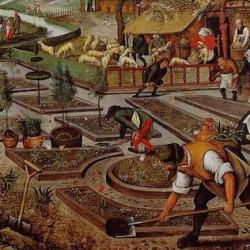Specialization and division of labor is often seen as one of the marks of modern society. Ernest Gellner ( Nations and Nationalism (New Perspectives on the Past) ) notes that the situation is more complicated. There are, he observes, specialists in complex agrarian societies (like medieval Europe), scholastics of great sophistication with a high degree of specialized training. In a sense, he says, they were even more specialized than modern specialists. In modern societies, “the distance between specialists is far less great. Their mysteries are far closer to mutual intelligibility, their manuals have idioms which overlap to a much greater extent.”
The reason, Gellner suggests, lies in our highly un specialized educational system: “the major part of training in industrial society is generic training, not specifically connected with the highly specialized professional activity of the person in question, and preceding it. Industrial society may be most criteria be the most highly specialized society ever; but its educational system is unquestionably the least specialized, the most universally standardized, that has ever existed. The same kind of training or education is given to all or most children and adolescents up to an astonishingly late age. Specialized schools have prestige only at the end of the educational process . . . . specialized schools intended for a younger, earlier intake have negative prestige.”










